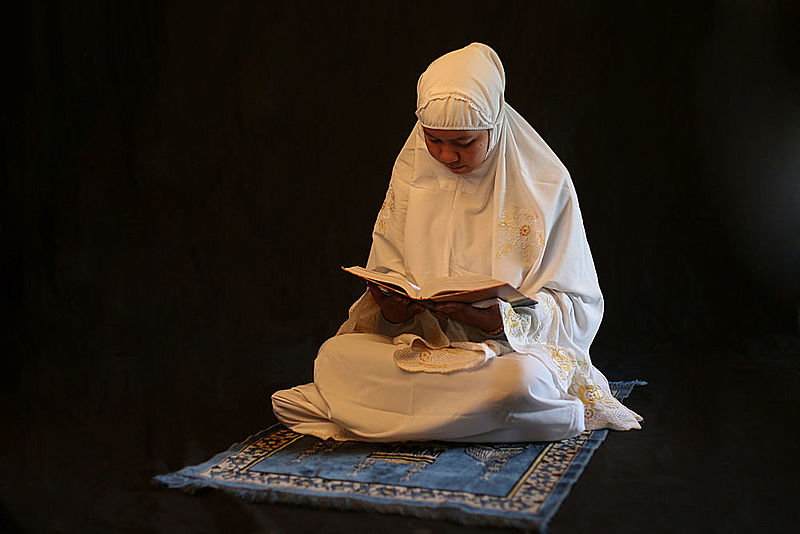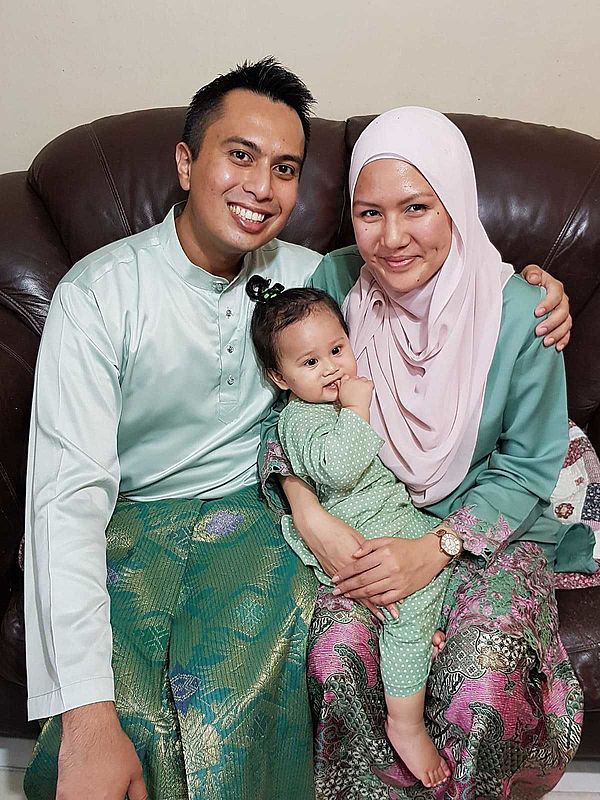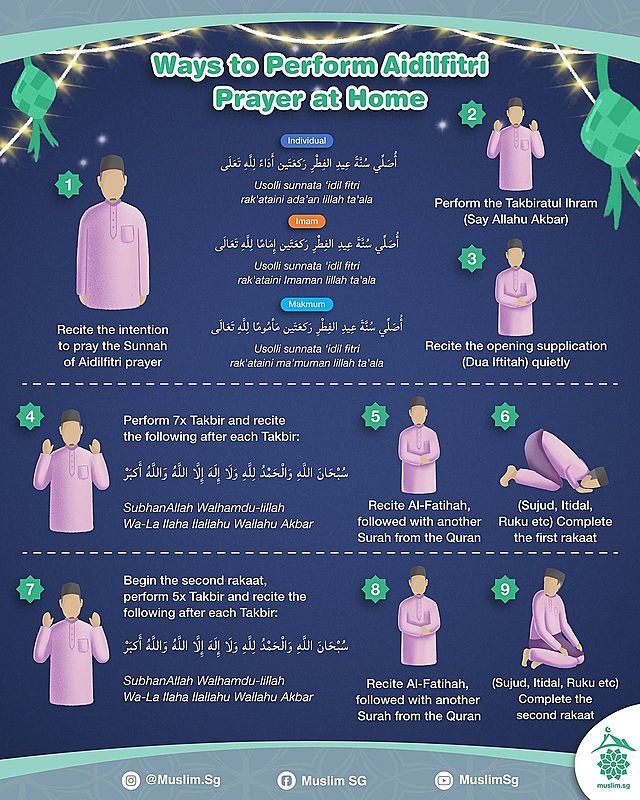Sunnah acts of Hari Raya Aidilfitri
Aidilfitri is an annual celebration of victory after the completion of Ramadan. It celebrates the bountiful blessings in store for those who strive to overcome their challenges and develop themselves to be better individuals in the sight of Allah s.w.t. during the blessed month. And may Allah s.w.t. accept our deeds.
Although the celebration of Aidilfitri will be different than in previous years, we can still hope to achieve a sense of victory blessed to us by Allah s.w.t. There is a list of sunnah acts of Aidilfitri that we can savour for more blessings and rewards. Here are 8 sunnah acts of Hari Raya Aidilfitri for us to partake in:
1. Enliven the night of Hari Raya Aidilfitri
Enlivening the night of Aidilfitri means celebrating on the eve of victory with acts of devotion to Allah s.w.t, just as we have strived to enliven the blessed nights in Ramadan.

Scholars have derived this merit from a hadith narrated by Abu Umamah r.a, where the Prophet s.a.w. said:
مَنْ أَحْيَا لَيْلَتَيْ الْعِيدَين لَمْ يَمُتْ قَلْبُهُ يَوْمَ تَمُوتُ الْقُلُوبُ
"Whoever enlivens the two nights of (Aidilfitri & Aidiladha), his heart will not wither in the day when all hearts die."
(Sunan Ibn Majah)
Although scholars consider the chain of transmission for this hadith weak (dha'if), we can still practise it in hopes of benefiting from whatever goodness is in store for us.[1] Besides, performing ritual acts of worship at any other time is considered a virtue.
You may enliven the blessed night by reciting the Quran or praying Isyak and Subuh in a congregation. Uthman Ibn Affan r.a. narrated that the Prophet s.a.w. said:
مَن صَلَّى العِشَاء فِي جَمَاعَةٍ فَكَأَنَّمَا قَامَ نِصْفَ اللَّيلِ وَمَن صَلَّى الصُبحَ فِي جَمَاعَةٍ فَكَأَنَّمَا صَلَّى اللَّيلَ كُلَّه
"Whoever prays Isyak prayer in congregation, it’s as if he has performed half of the night in prayer (Qiyam). And if one were to also perform Subuh prayer in congregation, then it is as if he has performed the whole night in prayer."
(Sahih Muslim)
2. Recite the Takbir

Reciting the takbir raya is part of the sunnah of Aidilfitri and enlivening the night of Aidilfitri. The period when it is permissible to recite the takbir begins from Maghrib (on the eve of Aidilfitri) until the commencement of the Aidilfitri sunnah prayer on the next day. In other words, your last moment of takbir is just before performing your sunnah Aidilfitri prayer, whether it is observed in congregation with the mosque or individually.
Read: How To Do Takbir Aidilfitri
3. Take a bath or shower
Another sunnah of Aidilfitri is to take a bath or shower. According to the dominant view within the Syafi'i mazhab, the period for you to perform the sunnah of bathing for Aidilfitri begins at midnight on the eve of Aidilfitri. This is different from the sunnah of bathing for the Friday prayers, which begins from Subuh (on the day itself).

The sunnah of bathing for Aidilfitri is not merely for performing the Aidilfitri prayers in congregation at the mosque. Instead, it is also to celebrate the day of Aidilfitri itself. Therefore, even if we do not go out to the mosque for the Aidilfitri prayers, we may still observe this beautiful sunnah and attain its rewards. Ibn 'Abbas r.a. narrated that the Prophet s.a.w. said:
كَانَ رَسُولُ اللهِ صَلَّى اللهُ عَلَيهِ وَسَلَّمَ يَغْتَسِلُ يَومَ الفِطْرِ وَيَومَ الأَضْحَى
"The Prophet s.a.w. would take a bath on the day of Aidilfitri and the day of Aidiladha."
(Sunan Ibn Majah)
4. Wear your best outfit and put on perfume

Wearing our best to express beauty and celebrate the day of victory is also part of the sunnah of Aidilfitri. Many of us here in Singapore would observe this sunnah by wearing our cultural clothes, like the baju kurung.
It doesn’t always have to be a new set of clothes. It could be the best in our wardrobe to display the beauty of our culture and religion, and that which suits the occasion best. At the same time, we should also avoid extravagance (spending unnecessarily) and ostentation (dressing up for the mere sake of showing off our prestige, attempting to emphasise our supposed superiority above others).
The Prophet s.a.w. would prepare a set of Yemeni clothing with red decorations distinctly just for celebrating Aidilfitri or Aidiladha.
كان النبيُّ صلَّى اللهُ عليْهِ وسلَّمَ يلبسُ يومَ العيدِ بُردةً حمراءَ
"He (the Prophet s.a.w.) would adorn on 'eid (Aidilfitri & Aidiladha) with a red cloak."
(Al-Mu'jam Al-Awsat)
Other than nice clothes, we are also encouraged to adorn ourselves appropriately and decently by getting a haircut and cutting our nails. This is part of the beautiful sunnah of our Prophet Muhammad s.a.w. too.
Part of the sunnah of Aidilfitri is to put on perfume as well. Hasan Ibn Ali r.a. informed us about the Prophet s.a.w:
أَمَرَنَا رَسُولُ اللهِ صَلَّى اللهُ عَلَيهِ وَسَلَّمَ أَنْ نَتَطَيَّبَ بِأَجْوَدِ مَا نَجِدُ فِي العِيد
"The Prophet s.a.w. once instructed us to put on perfumes with the best of what we have on (Aidilfitri / Aidiladha)"
(Al-Mu'jam Al-Kabir)
5. Eat before performing Aidilfitri Prayer at home
Before performing our Aidilfitri sunnah prayer, we are encouraged to at least take a little bite in the morning, such as dates, signifying the contrast between the Aidilftri and the fasting month of Ramadan. We should avoid overconsumption before our prayer so that we can perform it better.
كَانَ رَسُولُ اللَّهِ صلى الله عليه وسلم َلا يَغْدُو يَوْمَ الْفِطْرِ حَتَّى يَأْكُلَ تَمَرَاتٍ. ويأكلهن وِتراً
"The Prophet s.a.w. would not proceed (for the sunnah prayer) on the day of Aidilfitri unless he had eaten some dates. And he would eat them in odd numbers."
(Sahih Al-Bukhari)

As mentioned above, this also symbolises that we are no longer fasting. In fact, fasting on the day of Aidilfitri is prohibited in the religion. Even if the intention to fast is upon nazar[2] or to pay back the missed fast (qadha’). If we are looking forward to fasting for the six days in Syawal, we may do so from the 2nd day of Syawal onwards. The Prophet s.a.w. said:
لَا صَوْمَ فِي يَوْمَيْنِ الْفِطْرِ وَالأَضْحَى
"There is no fasting (prohibited) on the two days; Aidilfitri and Aidiladha."
(Sahih Al-Bukhari)
6. Perform the sunnah Aidilfitri prayer
The sunnah Aidilfitri prayer is a two raka’at prayer that includes additional takbir in between the Takbiratul Ihram and the recitation of Surah Al-Fatihah. It is considered one of the most highly recommended sunnah prayers (nawafil).
To know more on the details and how-tos, read: How to perform Aidilfitri Prayer: Step-by-step guide
7. Take a different route to and from the mosque for the sunnah Aidilfitri Prayer
It is recommended (sunnah) that you perform the sunnah Aidilfitri prayer at the mosque. However, if you cannot, you may also perform it at home or work due to your respective individual capacities and commitments.
For those who can go to the mosque, it is also a sunnah to take different routes to and from the mosque. For example, take a bus to the mosque and return back home walking. Or you can just walk and take different pathways. One benefit to this sunnah is to meet and greet others as we enliven the day of victory. Additionally, as congregants for the sunnah Aidilfitri prayer, it is also sunnah to arrive early at the mosque and recite the takbir together while waiting for the Imam or the commencement of the prayer.
Ladies who may be on their period can also attain the sunnah of listening to the khutbah from home. If you can't find the link to watch the live khutbah, you can always head to the khutbah webpage by the Office of the Mufti. Look out for the khutbah here: Khutbah | Prayer sermons
8. Greet and congratulate others
It is also part of the sunnah to greet others to celebrate Aidilfitri, a day of victory. We may choose to wish through the following expressions as an example “Salam Aidilfitri!” or “May Allah s.w.t. accept your deeds!”
This sunnah is not just limited to wishing our household members. We can also wish others through text messages or even through our social media pages. Once the time of Maghrib enters, we can start to observe this sunnah of wishing others in celebration of Hari Raya Aidilfitri
I would also like to take this opportunity to wish you a festive Salam Aidilfitri. Let us welcome the rest of the year with a hopeful mindset. Choose forgiveness and strengthen your bonds with your loved ones.
May Allah s.w.t. accept our deeds in Ramadan and beyond. And Allah knows best.
Here is a poster that you may want to share with your family and friends!

Notes:
[1] Although a hadith is considered weak in terms of its chain of transmission (not fabricated - maudhu'), according to scholars, it is permissible to practise the hadith, but it is prohibited to use it as evidence to make a point or justify a position.
[2] Nazar is a vow made before Allah s.w.t. to perform certain actions if certain conditions are met.




